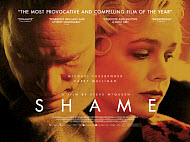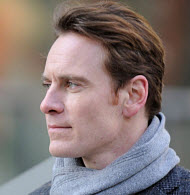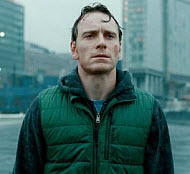Shame
Reviewed by: Dr. Jim O'Neill
CONTRIBUTOR
| Moral Rating: | Extremely Offensive |
| Moviemaking Quality: |
|
| Primary Audience: | Adults only |
| Genre: | Drama |
| Length: | 1 hr. 39 min. |
| Year of Release: | 2011 |
| USA Release: |
December 2, 2011 (limited) DVD: April 17, 2012 |












sex addiction / addict
PORNOGRAPHY—How can I tell if I’m getting addicted to pornography or sex? Answer
TEMPTATIONS—How can I deal with temptations? Answer
habitual masturbation
promiscuous fornication and adultery
PURITY—Should I save sex for marriage? Answer
What are the consequences of sexual immorality? Answer
being a bad, sinful person vs. goodness
meaningful, permanent relationships—TRUE LOVE—What is true love and how do you know when you have found it? Answer
Are we living in a moral Stone Age? Answer
“VOTING” FOR BAD MOVIES—Every time you buy a movie ticket or rent a video you are casting a vote telling Hollywood “That’s what I want.” Why does Hollywood continue to promote immoral programming? Are YOU part of the problem? Answer
brother sister relationship
male female relationships
| Featuring |
|---|
|
Michael Fassbender … Brandon Sullivan—‘Inglourious Basterds’, ‘Hunger’, ‘A Dangerous Method’ Carey Mulligan … Sissy Sullivan Lucy Walters … Woman on Subway Train Mari-Ange Ramirez … Alexa James Badge Dale … David Fisher Nicole Beharie … Marianne Alex Manette … Steven See all » |
| Director |
| Steve McQueen—‘Hunger’ |
| Producer |
|
Film4 See-Saw Films UK Film Council Momentum Pictures See all » |
| Distributor |
 Fox Searchlight Pictures, a sister company of 20th Century Fox, a division of The Walt Disney Company |
a shameful movie

Steve McQueen’s 2009 film, “Hunger”, about IRA rebel Bobby Sands’ hunger strike in Belfast’s Maze prison, was a remarkable debut. It was a gripping character study about a man who was obsessive about his own political philosophy and compulsive about putting his money, and his life, where his mouth was. McQueen’s new movie, “Shame”, unlike “Hunger”, is a fictional film, but the director once again focuses on a man obsessed, not with his own politics, but with his own carnal desires and ultimately his own destruction. His lust is unbridled in an environment, in this case a bleak stretch of Manhattan’s West Side between Hell’s Kitchen and Chelsea, that offers abundant opportunity for his temptations, and little restraint. Brandon is unable to make any sort of attachment beyond the physical and the momentary. The act he craves is ultimately a letdown; the only real excitement he gets is from the anticipation and the chase. When he does make an attempt to connect, he steps out of his element, and the result is a disaster, and a tragedy. He is unable to relate emotionally, to find anything within himself that he would want to share with someone else.
The film purports to be an open look at the subject of sexual addiction, but it suffers from the same distance and reserve that afflicts its main character. The New York setting is only vaguely familiar; it hardly resembles the city I know and live in. It’s a glossy, stark and coldly lit metropolis. There’s no warmth under the streetlights, on the subways, behind the glass walls of the tall office buildings or inside the small apartments. Even the “don’t walk” signs are unhinged and hanging by a thread. Despite all the bright lights in the big city, nothing shines; it’s all a deep dark sea with an undertow that never lets go.
The city moves the same way its main character does: fast, loose and on the cheap. Some critics have compared “Shame” to the 1968 film, “Midnight Cowboy”, made by John Schlesinger (an Englishman, as is McQueen), and set in Manhattan’s underworld, but “Cowboy…”, as grim as it was, had enough humor to keep the despair at bay. Yes, that film had a gutter milieu, but it was a setting from where you had a view of the sky; “Shame” puts you in a gutter from where you can only see the drainpipe. There’s nowhere to look but down.
Despite all the nudity, male and female, very little is actually revealed. Nothing is laid bare. After all the years of praise for what we refer to as “freedom of the screen”, of having more and more exposed, is this what we’ve come to? The fiery gaze of Valentino, the despairing sigh of Garbo, the tender frown of Giulietta Masina, the avuncular ferocity of Anthony Hopkins, all iconic and fully clothed images, have given way to what? Body parts? A lot of attention has been paid to the graphic nature of the film which has an NC-17 rating. “Midnight Cowboy” received an “X” rating in its day, the sixties’ equivalent of the NC-17, but that “X” signified not just the film’s content but the nature of its two main characters who represented society’s condemned and were effectively X-ed out by those around them.
If I remember right, Schlesinger welcomed that X rating, because it had something more meaningful to project than what the minimum age for admission to the theater should be. “Shame”, on the other hand, seems wrapped up in its own controversy about sex and nudity. Unfortunately, that takes away from some of the good things the film has to offer. There are not enough of those for me to recommend that you see it, but enough to remind one that McQueen is a worthy talent. There is still some of the fire and the artistry that was so evident in his first film. I especially liked a moving, and funny, restaurant scene between Brandon and a female co-worker, the woman with whom Brandon tries unsuccessfully to form a human bond. In that scene Brandon starts to open up and reveal parts of himself, but the more he does so, the more evident is the deep divide between him and the rest of the world.
After dinner, he walks his date to the subway, and they talk about what era they would like to live in, if they had a choice. Brandon wants to be a musician in the 1960s—a strange choice, since when he is alone in his apartment he seems to favor listening to fugues by Bach—and the sensitive woman brings him quickly back to reality by telling him that the sixties gave us Altamont, a reference to the disastrous Rolling Stones concert held in California in 1969, and captured so well in the documentary, “Gimme Shelter”. Altamont is as much a testament to the sixties as are the British invasion and Woodstock. Brandon’s dinner companion is a flesh and blood human being; she is no fantasy and will not let him live one. Unfortunately, for both of them, he is not up to the challenge.
McQueen and co-writer Abi Morgan construct two person scenes that bring everything to the surface; they know how to make their words punch and sting. They can bring out the drama in the everyday, and can reveal the essence of a personality in a few words. I hope they continue to work together, because they have the potential to create a great screenplay and a great movie. “Shame,” however, is not that movie.
Throughout most of the film, Brandon maintains a sturdy but blank mask that conceals his dark longings. Surprisingly, he never seems to lose his luster, especially at work. It’s hard to figure out exactly what his job is. He spends a lot of office time engaged in the same sorts of activities that take up his time outside the office; his boss, David, enables him by telling him that the graphic images found on his computer hard drive must be the work of the office intern.
Brandon doesn’t dissipate the way Ray Milland did in “Lost Weekend” or Frank Sinatra did in “The Man with the Golden Arm” or Nicolas Cage did in “Leaving Las Vegas”; his smile doesn’t shrink; in fact, it seems to broaden, his jaw stays taught and firm, and his eyes stay as bright but as cold as ever. Yet his addiction is as destructive as any drinkable or injectable one.
Brandon’s solo life is briefly interrupted when his younger sister, Sissy, comes to visit and to stay in his apartment. She is sweet, daft, and like her brother, very loose. Sissy has her own issues with intimacy, and, although she is not as hopeless or as soulless as her brother, she too is promiscuous and self destructive. She has a one night stand with Brandon’s married boss, while Brandon is in the apartment and can hear them on the other side of the wall. The three meet in a nightclub—a strange place that looks more like Liverpool in the 1960s than New York today—where Sissy sings “New York New York” in a slow languid drawl that goes on far too long. Her rendition deconstructs the song, originally a tribute to those who dream for something better, and pulls it down from its lofty tower. She takes all the spirit out of the song. When she’s finished her version, it stays with you the way castor oil and tear gas do, the way Jimi Hendrix’ “Star Spangled Banner” or Barbara Streisand’s “Happy Days are Here Again” do. It’s a downer that just won’t go away.
Sissy is played by British actress, Carey Mulligan. She’s no singer but she can sure act a song, which is probably more important than singing every note on key. Still, the scene doesn’t work, but the rest of her performance hits all the right notes. Sissy is a wounded soul who, like her brother, has achieved some degree of success in her career, but unlike him, is yearning for something more. She’s having a hard time finding love and peace, but she does not hide from herself the way her brother does.
Mulligan’s character craves attention, and, yet, the actress beckons us with slightly more than a whisper; you feel her sadness even when she turns away. She tells her brother that,
“We are not bad people. We just come from a bad place.”
see: What is sin and the fall of man? —lust, lasciviousness, fornication—and compare to What is goodness?
There is something disturbing about the relationship between brother and sister here; it’s too close and hints at a possible reason for the sexual dysfunction that both experience. It is only a hint; the film never acknowledges that something may have happened to them in their formative years that would lead them to where they are today; McQueen and Morgan do not probe the causes of Brandon’s and Sissy’s disorders. Those maladies, or sins, are starting points, and the film takes us forward, not backwards, from lust to fornication to bloodbath to death. Brandon’s journey is a one way street, and that street has an unfortunate end. His sister, in her own wayward style, tries to turn him around. Her desperation may be his only salvation. It’s another challenge that he may not be up to.
Michael Fassbender plays Brandon. He is a remarkable actor, who is also featured in this year’s “A Dangerous Method” about a famous psychiatrist who also had sexual issues. Carl Jung sublimated many of his urges; Brandon acts out all of his. Fassbender never lets Brandon’s mask fall, until the end, but he does let the cracks in the disguise open up enough to shed some light on his character. He does not make Brandon sympathetic or in the least way admirable. Brandon, after all, is a man who will stop at nothing to satisfy his desires. If a woman is not available, he turns to himself or to other men. Just when you think that he may be setting some boundaries, Fassbender lets you know that his character is a man who draws no lines.
A famous writer once said that hell is a place where the inhabitants have nothing to do but amuse themselves. In that place, there is nothing to be thankful for, nothing to be in awe of. McQueen has shown us such a place; it’s not unlike a Roman coliseum or King Herod’s court or the setting of any of the “E! True Hollywood” stories, and Fassbender has a way of making us not just look at the wreck, but to feel the metal. The movie does burn like fire, at times, but its dependence on the very obscenity that it warns us about ultimately makes this movie as remote and cold as the sad and tragic Brandon.
Violence: Heavy / Profanity: Extreme / Sex/Nudity: Extreme
See list of Relevant Issues—questions-and-answers.


It features a threesome between a man and two women, and full-frontal nudity on both parts. I would say, if you’re a Christian and you’re reading this, go and see something else, for the holy spirit will also convict you. We live in a world where there is so much explicit sexuality and lust and idolatry. And especially if your trying to stay away from sexual desires that are harmful, this film will only make you desire the wrong things even further.
I would not say that I am scarred by watching this, as I have watched things far worse and did struggle with pornography for a long time, but it fueled up something inside of me that I didn’t want and gave me even more images to fight against, when, actually, we should save our desires for the spouse in our future.
Moral rating: Extremely Offensive / Moviemaking quality: 3
PLEASE share your observations and insights to be posted here.

The truth is that Brandon has been struggling with sexual addiction for quite some time, and as we will see throughout the course of the film, it has begun to devour him completely. Unable to form intimate bonds and meaningful relationships, Brandon has become a slave to his most carnal desires. His life consists of casual trysts with prostitutes and random men and women from clubs and bars, sexual encounters over the webcam, voyeurism, and compulsive masturbation—not to mention a drug habit.
When his emotionally damaged sister, Sissy, unexpectedly shows up at his apartment in need of a place to stay, she quickly becomes a nuisance in his life, placing a barrier between Brandon and his addiction. When she discovers his dark secret, she is appalled, at first, but attempts to lead him to the path of recovery by reminding him that he is loved. These two damaged souls need one another to survive.
As the pressure mounts, Brandon’s life begins to unravel. He goes to the very depths of hell and back. He begins to lose control, until one day when he is forced to deal with his demons head on. There is hope for Brandon yet.
The performances in “Shame” are magnificent. Michael Fassbender delivers an Oscar worthy performance as the tortured Brandon. It is a tragedy that he was somehow overlooked for this years Oscar® race. Carey Mulligan is equally powerful as Sissy. She was extraordinary in “An Education,” and continues to impress with her monumental work here. The cinematography is gorgeous, and the score is haunting as well. All technical and artistic aspects are perfect.
This is an exceptionally powerful film, and it is not recommended for those who are easily offended. Director Steve McQueen refused to censor this material to gain an R rating, and so the film was branded with a well-deserved NC-17 rating. The sexual content is extremely explicit, but serves a purpose within the context of the film, and is never gratuitous. If you are seeking titillation, you will not find it here. Onscreen sex has never looked so repulsive. Sex addiction is a serious issue that is rarely dealt with in the cinema. Steve McQueen tackles the subject with respect and constraint. The results are disturbing and rewarding. “Shame” is one of the best films of 2012.
My Ratings: Moral rating: Extremely Offensive / Moviemaking quality: 5